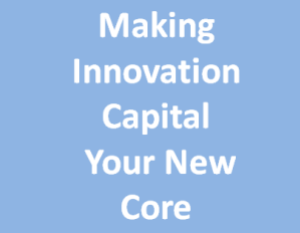 I clearly believe we do need to understand the strategic importance of the make-up of our innovation capital, yet presently nearly all our corporate boards lack any clear line of sight into this. Why?
I clearly believe we do need to understand the strategic importance of the make-up of our innovation capital, yet presently nearly all our corporate boards lack any clear line of sight into this. Why?
Not understanding what makes up the capital is holding innovation back. We are actually constraining growth through this lack of understanding as it makes us all cautious of the future.
If we don’t fully understand the make-up of all our capital should we invest or divert resources to delivering on it? I think it is high time we did.
So what makes up our innovation capital and why is it important to know?
Should we care, does it matter? I would argue it does, increasingly so. Within the innovation capital lies the future of the organization and holds one of the real golden keys to the sustaining performance of the company, or not.
Continue reading “Holding the innovations of the future back”


